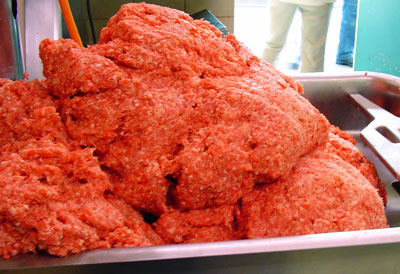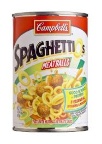Julie Schmit and Elizabeth Weise reported in USA Today on July 27, 2007 that retailers have been slow to pull Castleberry’s canned chili products that may contain botulism.
Robert Brackett, then director of the FDA’s Center for Food Safety and Applied Nutrition (best wishes on the new Illinois job, Bob — dp) said  consumers may be suffering "recall fatigue," given the rash of recalls the past year for spinach, carrot juice, lettuce, peanut butter, pet food and other products. "That’s a real phenomenon. If people aren’t getting sick or their family isn’t, they think ‘Oh, it’s not going to happen to me.’"
consumers may be suffering "recall fatigue," given the rash of recalls the past year for spinach, carrot juice, lettuce, peanut butter, pet food and other products. "That’s a real phenomenon. If people aren’t getting sick or their family isn’t, they think ‘Oh, it’s not going to happen to me.’"
I told the reporters at the time that public communications about such undertaking must be rapid, reliable, repeated and relevant, and that the produce outbreaks of 2006 marked significant changes in how stories were being told on Internet-based networking like YouTube, wikipedia, and blogs. Producers, processors, retailers and regulators of agricultural commodities not only need to be seen — and actually — responding to food safety issues in conventional media, they must now pay particular attention to the myriad of Internet-based social networking sites that allow individuals to act as their own media outlet. Further, proactive producers, regulators and others in the farm-to-fork food safety system will become comfortable with the directness — and especially the speed — of new Internet-based media.
Three years later, the Washington Post reported this morning that government regulators, retailers, manufacturers and consumer experts are concerned that recall notices have become so frequent across a range of goods — foods, consumer products, cars — that the public is suffering from "recall fatigue."
Witty.
In many cases, people simply ignore urgent calls to destroy or return defective goods.
One recent study found that 12 percent of Americans who knew they had recalled food at home ate it anyway.
Jeff Farrar, associate commissioner for food protection at the Food and Drug Administration, who said even his wife has complained about the difficulty of keeping pace with recalls, added,
"It’s a real issue. That number is steadily going up, and it’s difficult for us to get the word out without oversaturating consumers."
Craig Wilson, assistant vice president for quality assurance and food safety at Costco, was quoted as saying,
"The national recall system that’s in place now just doesn’t work. We call it the Chicken Little syndrome. If you keep shouting at the wind — ‘The sky is falling! The sky is falling!’ — people literally become immune to the message."
The U.S. Department of Agriculture today said the Government’s Products Recall app for the Android smartphone is now available at the revamped USA.gov website, and the apps for Blackberry and iPhone are soon to follow.
And it will be the same boring message. It’s the medium and the message, if you want to get people’s attention.
 cutting Carrefour Selection, and discovered E. coli.
cutting Carrefour Selection, and discovered E. coli.
 disease before taking corrective action.
disease before taking corrective action.
.jpg) infestations cited in a federal report stretch back at least a decade.?? The workers also reported ammonia levels high enough to cause chronic health problems, and inconsistent availability of safety equipment such as face masks and gloves.
infestations cited in a federal report stretch back at least a decade.?? The workers also reported ammonia levels high enough to cause chronic health problems, and inconsistent availability of safety equipment such as face masks and gloves. information like geographic location, date of onset and other public health basics that may limit additional illnesses is being withheld. The Canadian Food Inspection Agency will only say it “is aware of an E. coli O157:H7 illness outbreak in Ontario.”
information like geographic location, date of onset and other public health basics that may limit additional illnesses is being withheld. The Canadian Food Inspection Agency will only say it “is aware of an E. coli O157:H7 illness outbreak in Ontario.” Health and Food Safety announced.
Health and Food Safety announced. an electrician.
an electrician. is to accomplished in a hamburger patty. And while thorough cooking to the appropriate temperature (the. U.S. says 160) will destroy the bad bugs, cross-contamination in any kitchen – home, food service, retail – is a huge issue and difficult to control. Here’s the story.
is to accomplished in a hamburger patty. And while thorough cooking to the appropriate temperature (the. U.S. says 160) will destroy the bad bugs, cross-contamination in any kitchen – home, food service, retail – is a huge issue and difficult to control. Here’s the story..jpg) Poitou-Charentes et Rhône-Alpes regions. For Casino, the center and the southwest quarter of the country are concerned.
Poitou-Charentes et Rhône-Alpes regions. For Casino, the center and the southwest quarter of the country are concerned. consumers may be suffering "recall fatigue," given the rash of recalls the past year for spinach, carrot juice, lettuce, peanut butter, pet food and other products. "That’s a real phenomenon. If people aren’t getting sick or their family isn’t, they think ‘Oh, it’s not going to happen to me.’"
consumers may be suffering "recall fatigue," given the rash of recalls the past year for spinach, carrot juice, lettuce, peanut butter, pet food and other products. "That’s a real phenomenon. If people aren’t getting sick or their family isn’t, they think ‘Oh, it’s not going to happen to me.’"  It’s also not the movie to watch the day of a wedding engagement, like me and my ex did in 1984; does not portend well.
It’s also not the movie to watch the day of a wedding engagement, like me and my ex did in 1984; does not portend well. Daughter Sorenne likes the pasta/sugary/salt/sauce thingies like SpaghettiOs, and we had a can of the stuff, although not the meatball one. But with Katie finally completing her epic journey to Manhattan (Kansas), and me making lunch for everyone today, I went with whole-wheat rotini, and a sauce of garlic, onion, red pepper, tomatoes, chicken stock, chili sauce, a bunch of basil from our expanding basil patch and shrimp.
Daughter Sorenne likes the pasta/sugary/salt/sauce thingies like SpaghettiOs, and we had a can of the stuff, although not the meatball one. But with Katie finally completing her epic journey to Manhattan (Kansas), and me making lunch for everyone today, I went with whole-wheat rotini, and a sauce of garlic, onion, red pepper, tomatoes, chicken stock, chili sauce, a bunch of basil from our expanding basil patch and shrimp. Although Canada’s track record with ridiculous things said involving listeria is hard to match.
Although Canada’s track record with ridiculous things said involving listeria is hard to match.